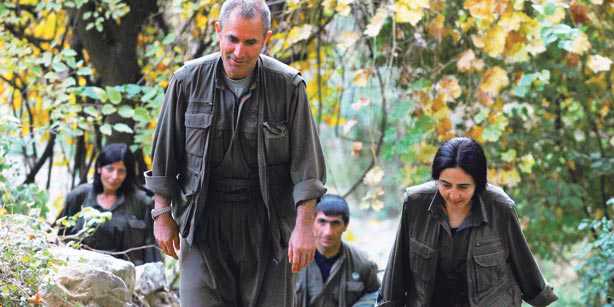
ERCAN YAVUZ, ANKARA
An intelligence report prepared by the National Intelligence Organization (MİT) and presented at a National Security Council (MGK) meeting on Feb. 24 suggests that the terrorist Kurdistan Workers’ Party (PKK) has been forging new ties with the state of Israel. The report also notes that the PKK has plans for a serhildan, the Kurdish word for uprising, in the spring in an attempt to manipulate the June 12 general elections. A senior security official, who asked not to be named, shared information about the intelligence gathered on the PKK with Today’s Zaman. According to the information, the group earlier this month ended a cease-fire it had announced late last summer.
It also says some countries in the region seem to have convinced the PKK to re-launch its attacks ahead of the elections. The same official says that intelligence reports indicate Israel has intensified its contact with the PKK in retaliation for a meeting Prime Minister Recep Tayyip Erdoğan had with Hezbollah during a visit to Lebanon. Intelligence reports say the PKK is concerned about a drop in the votes of the Peace and Democracy Party (BDP), whose candidates will run as independents. For this reason, the decision to end the cease-fire came easily for the PKK, which is trying to stop Kurdish votes from slipping to the Justice and Development Party (AK Party). The terrorist group has plans to hold constant demonstrations and clashes in the Southeast and in eastern provinces with a significant Kurdish population.
PKK-Israel links
The MİT report presented during the MGK meeting in late February chaired by President Abdullah Gül also includes interviews with various PKK militants on the terrorist group’s action strategy for this spring. In these interviews, the militants confessed to having received training from Mossad officials.
MİT also has footage from an interview in which PKK second-in-command Murat Karayılan says the PKK attacked the İskenderun naval base during the May 2010 flotilla crisis, in which Israel killed nine Turks on board a Gaza-bound civilian aid ship sailing in international waters. In the video, Karayılan says the PKK and Israel worked together during the Mavi Marmara incident. Experts say this video is evidence that the PKK and Israel work in coordination in some of the terrorist group’s attacks. The interview has already been aired on an Israeli television station.
PKK action strategy
The report also says the PKK plans to put pressure on Kurdish voters. It is planning a dramatic attack to make it clear that it has ended its cease-fire. The group was also inspired by the recent uprisings rocking the Arab world. Today, International Women’s Day, and the three-day-long spring festival of Nevruz, celebrated around March 20, will be the dates the PKK will focus on to start its campaign of agitation and chaos. It also has plans to sabotage the election rallies of political parties in the region other than those of the BDP.
The PKK’s real concern is weakened support for the BDP in the region, but it will use as an argument for its attacks and demonstrations the slowdown in the government’s democratic initiative process.
The plan includes nighttime demonstrations, press statements, illegal protests and passing out declarations. They will also engage in demonstrations that they will call “acts of civil disobedience” during visits from Prime Minister Erdoğan and officials of other political parties.
The PKK also seeks to carry its demonstrations to cities with sizable Kurdish populations, such as İstanbul, Mersin, Adana, İzmir and Ankara. As has happened in the past, they are expected to use children in the front line during demonstrations in these cities. Intelligence information also suggests that the PKK will seek to manipulate the Kurds in the Southeast by passing out anti-Kurdish declarations. In fact, such fliers, referring to those participating in pro-Kurdish demonstrations as “anarchical punks and lowlifes” were passed around in Yüksekova, Hakkari province, on Feb. 19, 2011. It included other expressions likely to provoke the Kurdish people.
www.todayszaman.com, 08 March 2011